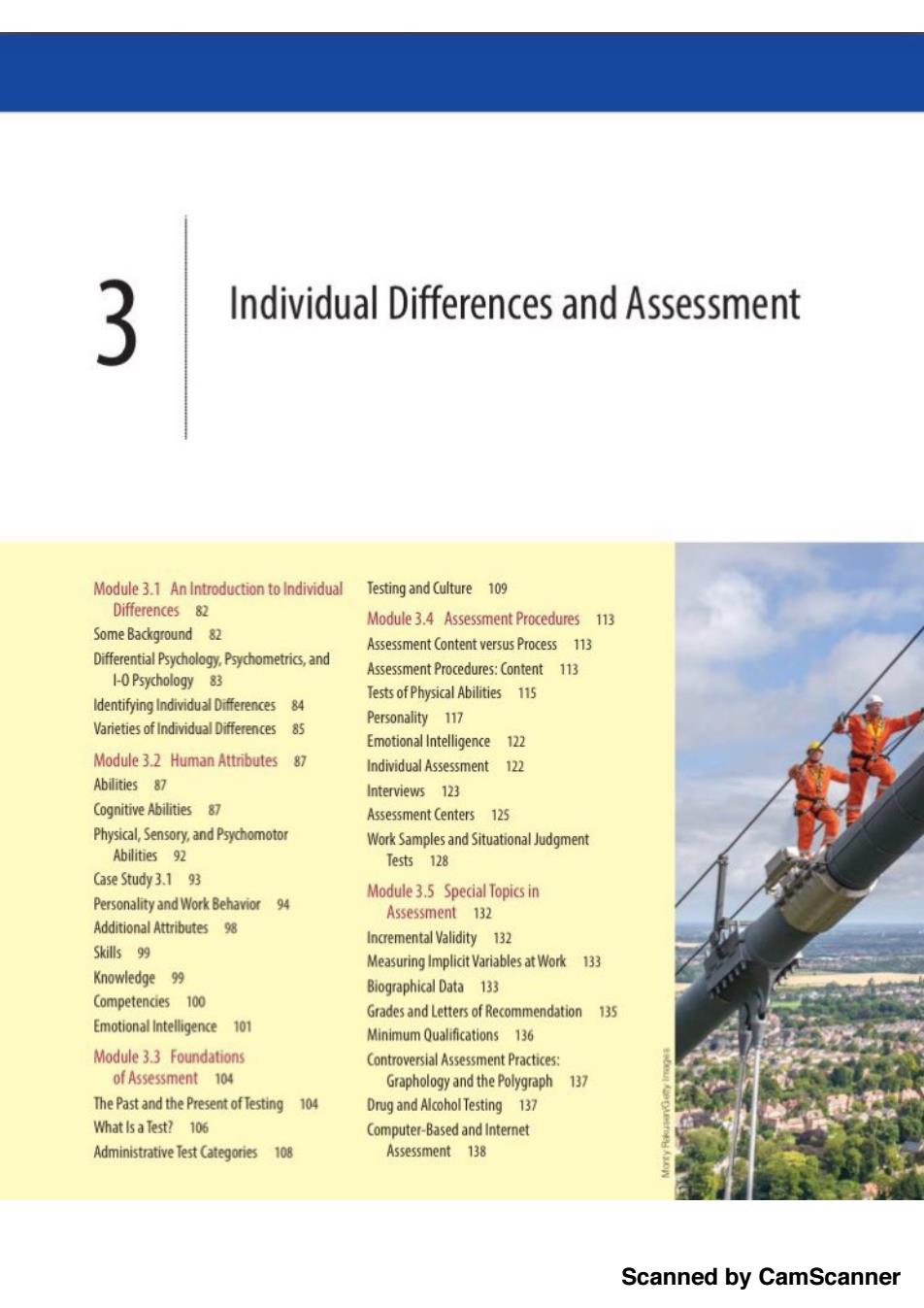
3 Individual Differences and Assessment Module 3.1 An Introduction to Individual Testing and Culture 109 Differences 82 Module 3.4 Assessment Procedures 113 Some Background 82 Assessment Content versus Process 113 Differential Psychology.Psychometrics,and 1-0 Psychology 83 Assessment Procedures:Content 113 Tests of Physical Abilities 115 ldentifying Individual Differences 84 Varieties of Individual Differences Personality 117 85 Emotional Intelligence 122 Module 3.2 Human Attributes 87 Individual Assessment 122 Abilities 87 Interviews 123 ognitive Abilitie色 87 Assessment Centers 125 Physical,Sensory,and Psychomotor Work Samples and Situational Judgment Abilities 92 Tes市128 Case Study 3.1 93 Module3.5 Special Topics in Personality and Work Behavior 94 Assessment 132 Additional Attributes 98 Incremental Validity 132 Skills 99 Measuring Implicit Variables at Work 133 Knowledge 99 Biographical Data 133 Competencies 100 Grades and Letters of Recommendation 135 Emotional Intelligence 101 Minimum Qualifications 136 Module 3.3 Foundations Controversial Assessment Practices: of Assessment 104 Graphology and the Polygraph 137 The Past and the Present of Testing 104 Drug and Alcohol Testing 137 What Is a Test?106 Computer-Based and Internet Administrative Test Categories 108 Assessment 138 Scanned by CamScanner
Scanned by CamScanner
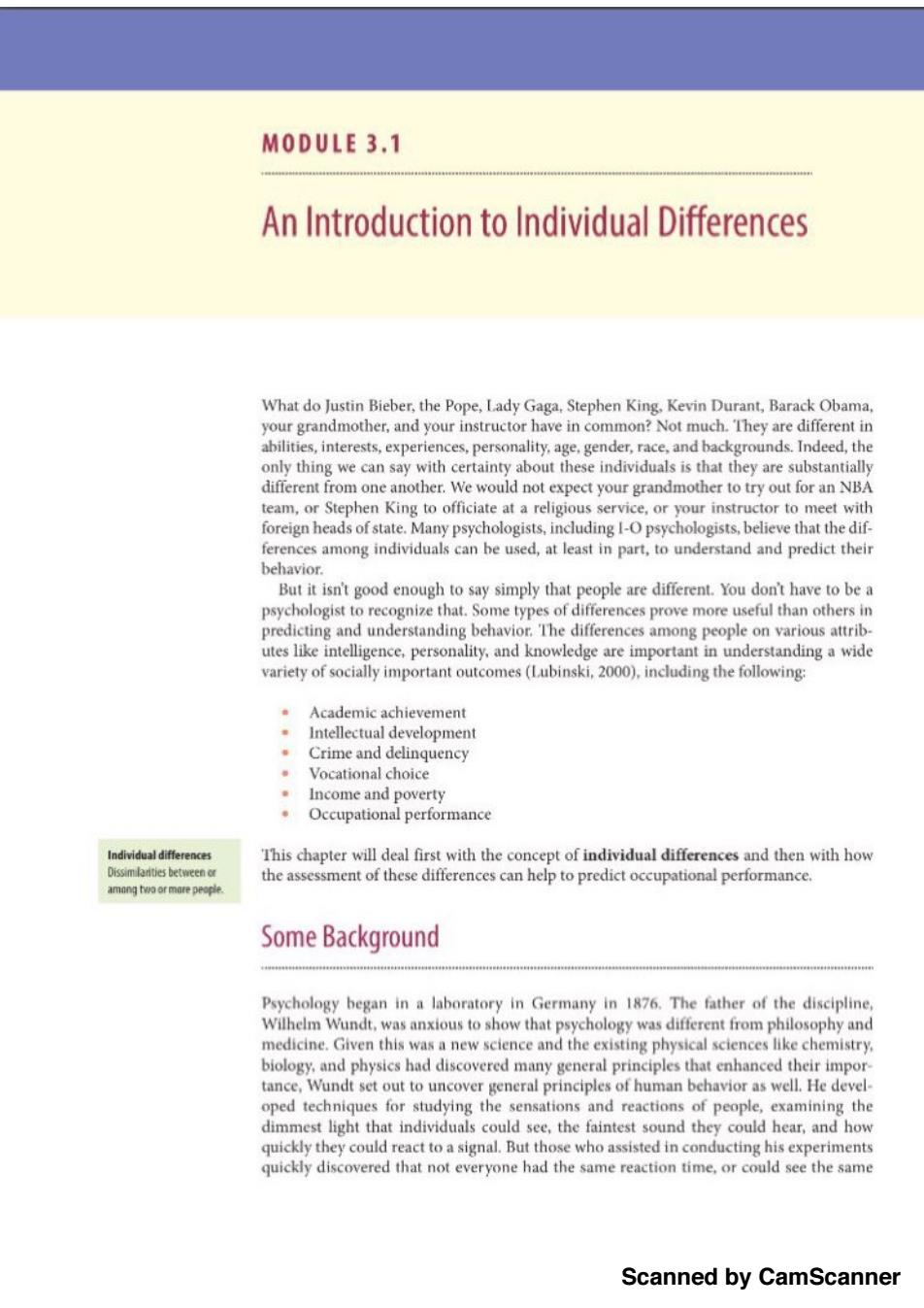
MODULE 3.1 An Introduction to Individual Differences What do Justin Bieber,the Pope,Lady Gaga,Stephen King.Kevin Durant,Barack Obama, your grandmother,and your instructor have in common?Not much.They are different in abilities,interests,experiences,personality,age,gender,race,and backgrounds.Indeed,the only thing we can say with certainty about these individuals is that they are substantially different from one another.We would not expect your grandmother to try out for an NBA team,or Stephen King to officiate at a religious service,or your instructor to meet with foreign heads of state.Many psychologists,including I-O psychologists,believe that the dif- ferences among individuals can be used,at least in part,to understand and predict their behavior. But it isn't good enough to say simply that people are different.You don't have to be a psychologist to recognize that.Some types of differences prove more useful than others in predicting and understanding behavior.The differences among people on various attrib- utes like intelligence,personality,and knowledge are important in understanding a wide variety of socially important outcomes(Lubinski,2000),including the following: Academic achievement Intellectual development Crime and delinquency Vocational choice Income and poverty Occupational performance Individual differences This chapter will deal first with the concept of individual differences and then with how Dissimlarties between c the assessment of these differences can help to predict occupational performance. amg0 or mare pec年e Some Background Psychology began in a laboratory in Germany in 1876.The father of the discipline Wilhelm Wundt,was anxious to show that psychology was different from philosophy and medicine.Given this was a new science and the existing physical sciences like chemistry, biology,and physics had discovered many general principles that enhanced their impor- tance,Wundt set out to uncover general principles of human behavior as well.He devel- oped techniques for studying the sensations and reactions of people,examining the dimmest light that individuals could see,the faintest sound they could hear,and how quickly they could react to a signal.But those who assisted in conducting his experiments quickly discovered that not everyone had the same reaction time,or could see the same Scanned by CamScanner
Scanned by CamScanner
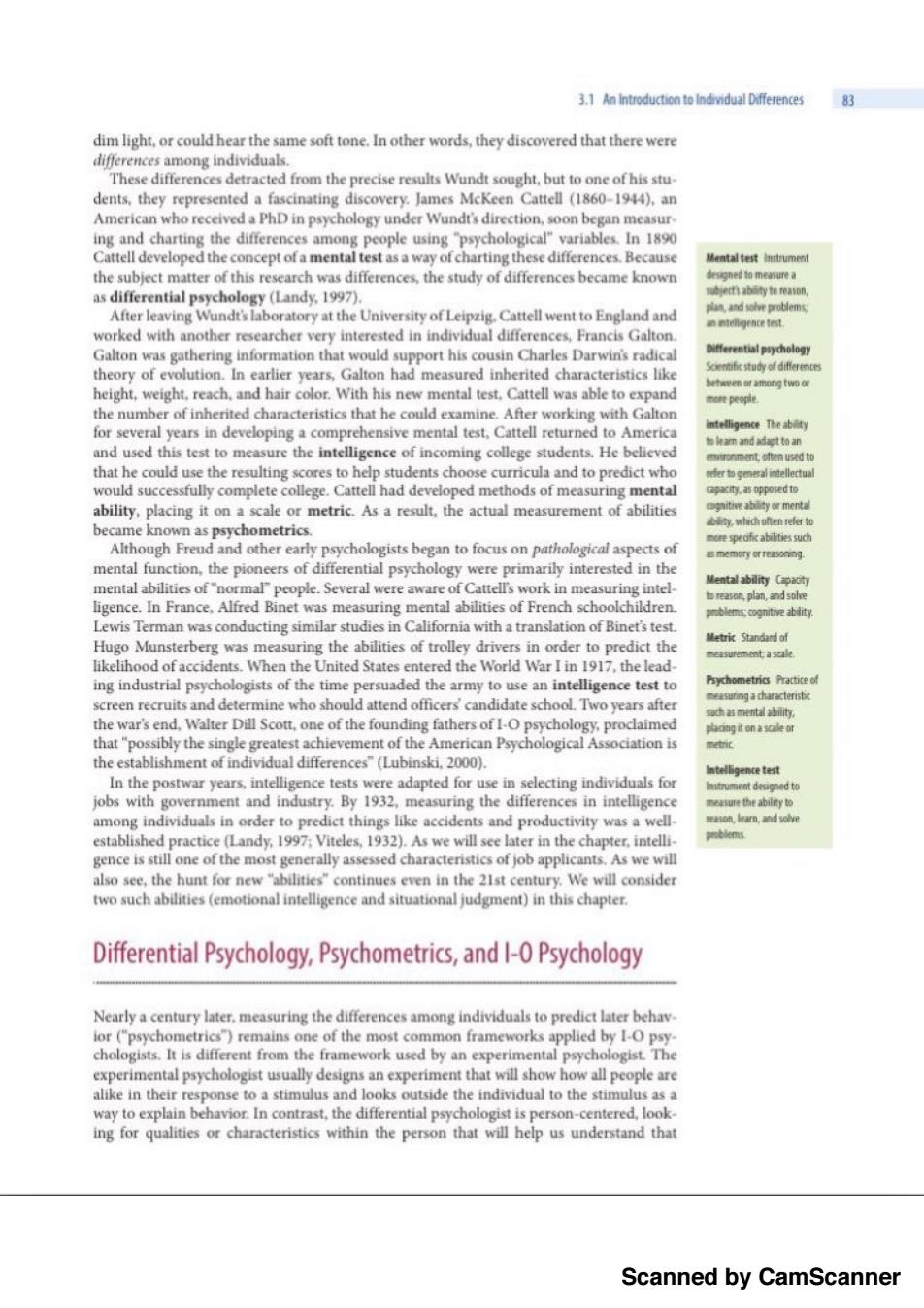
3.1 An Introduction to Individual Differences 83 dim light,or could hear the same soft tone.In other words,they discovered that there were differences among individuals. These differences detracted from the precise results Wundt sought,but to one of his stu- dents,they represented a fascinating discovery.James McKeen Cattell(1860-1944).an American who received a PhD in psychology under Wundt's direction,soon began measur. ing and charting the differences among people using psychological"variables.In 1890 Cattell developed the concept of a mental test as a way of charting these differences.Because Mentaltest imtrumen the subject matter of this research was differences,the study of differences became known designed to meaure a as differential psychology (Landy,1997). 哈cabty to花aso明 After leaving Wundt's laboratory at the University of Leipzig.Cattell went to England and 线andsolve problem nn时eligence test worked with another researcher very interested in individual differences,Francis Galton. Galton was gathering information that would support his cousin Charles Darwin's radical Differential prychology theory of evolution.In earlier years,Galton had measured inherited characteristics like Sientific study o时differences etween解mong tw00联 height,weight,reach,and hair color.With his new mental test.Cattell was able to expand F0时peopie the number of inherited characteristics that he could examine.After working with Galton for several years in developing a comprehensive mental test,Cattell returned to America intelligence The abity te lean and adag时toan and used this test to measure the intelligence of incoming college students.He believed miroement often us对to that he could use the resulting scores to help students choose curricula and to predict who der to ceral intellectua would successfully complete college.Cattell had developed methods of measuring mental Gp布.a站钟p0sed地 ability,placing it on a scale or metric.As a result,the actual measurement of abilities 奇which often refer to became known as psychometrics. Although Freud and other early psychologists began to focus on pathological aspects of mental function,the pioneers of differential psychology were primarily interested in the mental abilities of"normal"people.Several were aware of Cattell's work in measuring intel. Mental abil时pc动 reason,plan,and so小e ligence.In France,Alfred Binet was measuring mental abilities of French schoolchildren. citive ablity Lewis Terman was conducting similar studies in California with a translation of Binet's test. Metric St中andard of Hugo Munsterberg was measuring the abilities of trolley drivers in order to predict the measurement a scale likelihood of accidents.When the United States entered the World War I in 1917,the lead. ing industrial psychologists of the time persuaded the army to use an intelligence test to Psychometrics Practice of screen recruits and determine who should attend officers'candidate school.Two years after measuring a characteristic the war's end.Walter Dill Scott,one of the founding fathers of 1-O psychology,proclaimed that"possibly the single greatest achievement of the American Psychological Association is the establishment of individual differences"(Lubinski,2000). Intelligence test In the postwar years,intelligence tests were adapted for use in selecting individuals for lstrument designed to jobs with government and industry.By 1932.measuring the differences in intelligence e绿u时尚ea动h的轮 among individuals in order to predict things like accidents and productivity was a well- eason,learn.and solve established practice (Landy,1997;Viteles,1932).As we will see later in the chapter,intelli- gence is still one of the most generally assessed characteristics of job applicants.As we will also see,the hunt for new"abilities"continues even in the 21st century.We will consider two such abilities (emotional intelligence and situational judgment)in this chapter. Differential Psychology,Psychometrics,and I-0 Psychology Nearly a century later.measuring the differences among individuals to predict later behav. ior ("psychometrics")remains one of the most common frameworks applied by 1-0 psy- chologists.It is different from the framework used by an experimental psychologist.The experimental psychologist usually designs an experiment that will show how all people are alike in their response to a stimulus and looks outside the individual to the stimulus as a way to explain behavior.In contrast,the differential psychologist is person-centered,look. ing for qualities or characteristics within the person that will help us understand that Scanned by CamScanner
Scanned by CamScanner
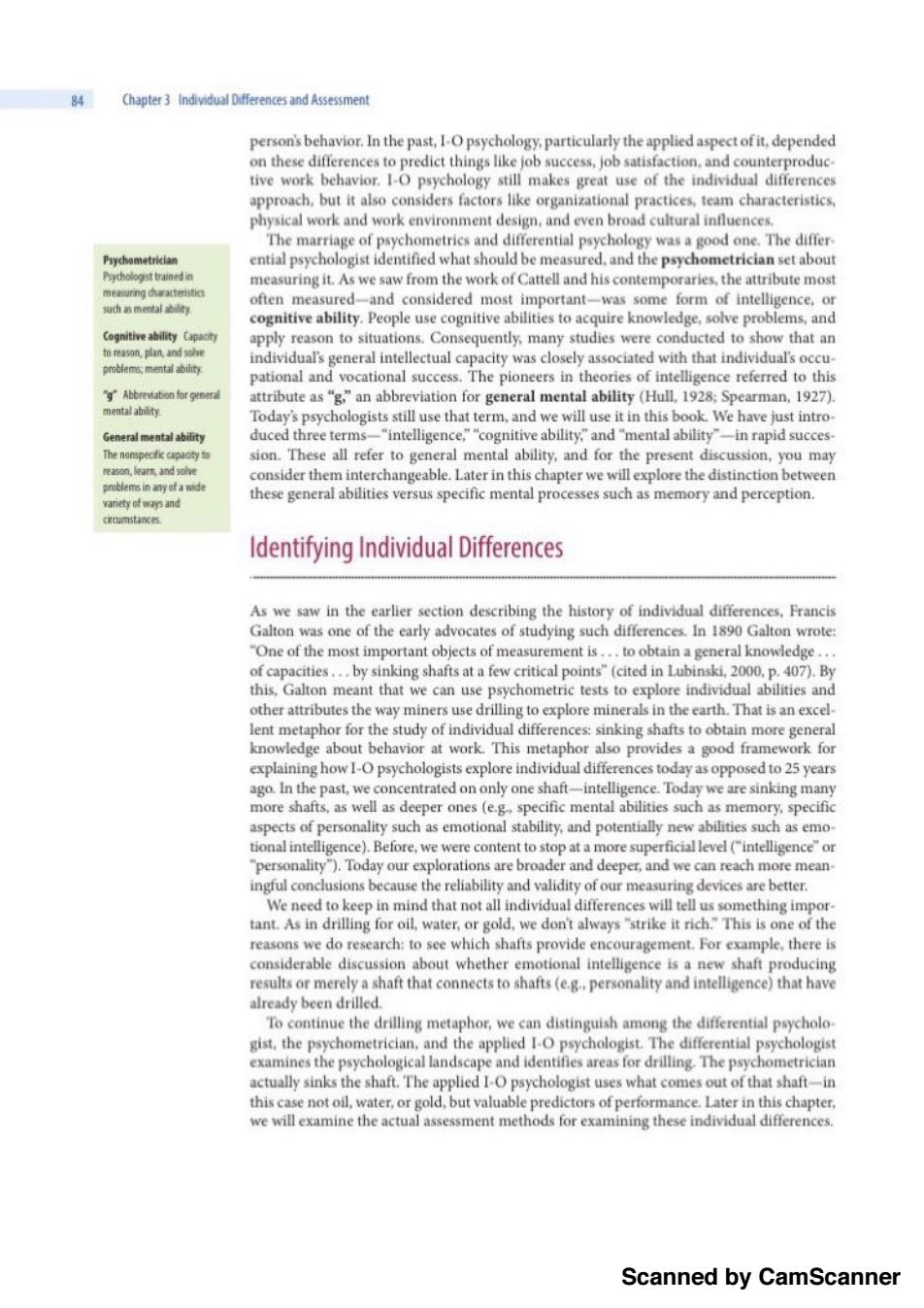
84 Chapter 3 Individual Differences and Assessment person's behavior.In the past,I-O psychology,particularly the applied aspect ofit,depended on these differences to predict things like job success,job satisfaction,and counterproduc. tive work behavior.I-O psychology still makes great use of the individual differences approach,but it also considers factors like organizational practices,team characteristics. physical work and work environment design,and even broad cultural influences. The marriage of psychometrics and differential psychology was a good one.The differ. Psychometrician ential psychologist identified what should be measured,and the psychometrician set about Psychologist trainedin measuring it.As we saw from the work of Cattell and his contemporaries,the attribute most me时ring characteristic 烟h as mental ab often measured-and considered most important-was some form of intelligence,or cognitive ability.People use cognitive abilities to acquire knowledge,solve problems,and Cognitive ability Capacity apply reason to situations.Consequently,many studies were conducted to show that an D他ason,an,and solve individual's general intellectual capacity was closely associated with that individual's occu- pote脑mnt边it pational and vocational success.The pioneers in theories of intelligence referred to this "g"Abbeevtation for geera attribute as"g"an abbreviation for general mental ability (Hull,1928;Spearman,1927). mental ability. Today's psychologists still use that term,and we will use it in this book.We have just intro- General mental ability duced three terms-"intelligence,""cognitive ability,"and "mental ability"-in rapid succes- The nonspecfi cap1oyt每 sion.These all refer to general mental ability,and for the present discussion,you may reason,leam,and solve beany fawde consider them interchangeable.Later in this chapter we will explore the distinction between these general abilities versus specific mental processes such as memory and perception. anety of wa师and crcmstances Identifying Individual Differences As we saw in the earlier section describing the history of individual differences.Francis Galton was one of the early advocates of studying such differences.In 1890 Galton wrote: "One of the most important objects of measurement is...to obtain a general knowledge... of capacities...by sinking shafts at a few critical points"(cited in Lubinski,2000,p.407).By this,Galton meant that we can use psychometric tests to explore individual abilities and other attributes the way miners use drilling to explore minerals in the earth.That is an excel. lent metaphor for the study of individual differences:sinking shafts to obtain more general knowledge about behavior at work.This metaphor also provides a good framework for explaining how I-O psychologists explore individual differences today as opposed to 25 years ago.In the past,we concentrated on only one shaft-intelligence.Today we are sinking many more shafts,as well as deeper ones (e.g,specific mental abilities such as memory,specific aspects of personality such as emotional stability,and potentially new abilities such as emo- tional intelligence).Before,we were content to stop at a more superficiallevel("intelligence"or personality").Today our explorations are broader and deeper,and we can reach more mean- ingful conclusions because the reliability and validity of our measuring devices are better. We need to keep in mind that not all individual differences will tell us something impor- tant.As in drilling for oil,water,or gold,we don't always "strike it rich."This is one of the reasons we do research:to see which shafts provide encouragement.For example,there is considerable discussion about whether emotional intelligence is a new shaft producing results or merely a shaft that connects to shafts (e.g..personality and intelligence)that have already been drilled. To continue the drilling metaphor,we can distinguish among the differential psycholo gist,the psychometrician,and the applied I-O psychologist.The differential psychologist examines the psychological landscape and identifies areas for drilling.The psychometrician actually sinks the shaft.The applied I-O psychologist uses what comes out of that shaft-in this case not oil,water,or gold,but valuable predictors of performance.Later in this chapter, we will examine the actual assessment methods for examining these individual differences. Scanned by CamScanner
Scanned by CamScanner
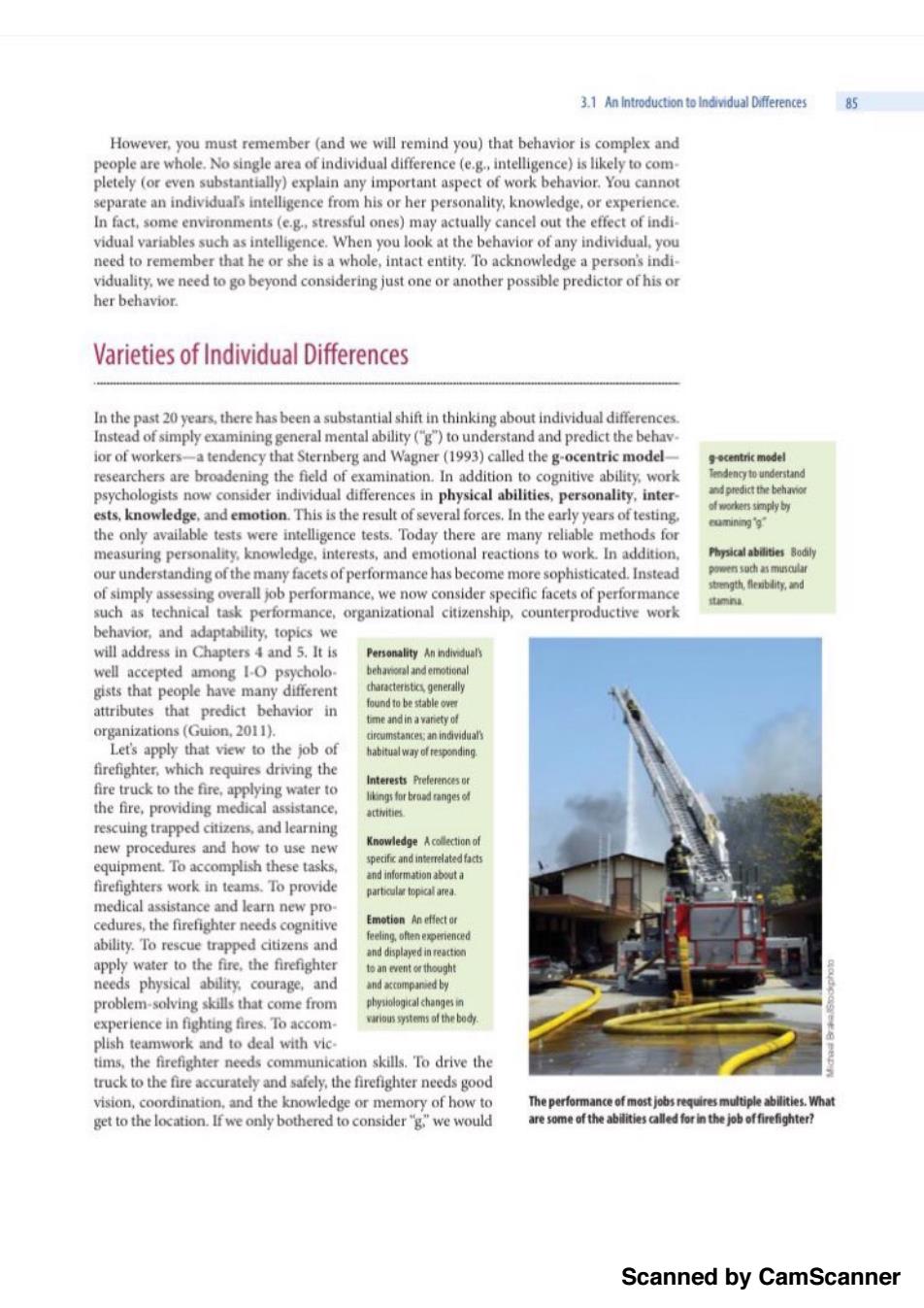
3.1 An Introduction to Individual Differences 85 However,you must remember (and we will remind you)that behavior is complex and people are whole.No single area of individual difference (e.g.,intelligence)is likely to com- pletely (or even substantially)explain any important aspect of work behavior.You cannot separate an individuals intelligence from his or her personality,knowledge,or experience. In fact,some environments (e.g,stressful ones)may actually cancel out the effect of indi. vidual variables such as intelligence.When you look at the behavior of any individual,you need to remember that he or she is a whole,intact entity.To acknowledge a person's indi- viduality,we need to go beyond considering just one or another possible predictor of his or her behavior. Varieties of Individual Differences In the past 20 years,there has been a substantial shift in thinking about individual differences. Instead of simply examining general mental ability ("g")to understand and predict the behav. ior of workers-a tendency that Sternberg and Wagner(1993)called the g-ocentric model- 号ocentric model researchers are broadening the field of examination.In addition to cognitive ability,work ndency to understand psychologists now consider individual differences in physical abilities,personality,inter- andpredict the behavoe ests,knowledge,and emotion.This is the result of several forces.In the early years of testing. of workerssimp内y cumining'g the only available tests were intelligence tests.Today there are many reliable methods for measuring personality,knowledge,interests,and emotional reactions to work.In addition. Physical abilities Bodily our understanding of the many facets of performance has become more sophisticated.Instead powers such as muscular of simply assessing overall job performance,we now consider specific facets of performance ngth flexbi年nd stamna. such as technical task performance,organizational citizenship,counterproductive work behavior.and adaptability,topics we will address in Chapters 4 and 5.It is Personality An individuals well accepted among 1-O psycholo. behavioral and emotional gists that people have many different characteristics generally attributes that predict behavior in found to be stableove time and in a variety of organizations(Guion.2011). circumstances:an individual's Let's apply that view to the job of habitualway of responding firefighter,which requires driving the Interests Preferences or fire truck to the fire,applying water to likings for broad ranges of the fire,providing medical assistance, actiities rescuing trapped citizens,and learning new procedures and how to use new Knowledge Acollection of specific and interrelated facts equipment.To accomplish these tasks. and information about a firefighters work in teams.To provide partcular topicalarea medical assistance and learn new pro- cedures,the firefighter needs cognitive Emotion An effect or feeling.often experienced ability.To rescue trapped citizens and and displayed in reactio的 apply water to the fire.the firefighter toan evento thought needs physical ability.courage,and and accompanied by problem-solving skills that come from hysiological chan明sn experience in fighting fires.To accom- various systems of the body. plish teamwork and to deal with vic. tims,the firefighter needs communication skills.To drive the truck to the fire accurately and safely,the firefighter needs good vision,coordination,and the knowledge or memory of how to The performance of most jobs requires multiple abilities.What get to the location.If we only bothered to consider'g.we would are some of the abilities called for in the job offirefighter? Scanned by CamScanner
Scanned by CamScanner
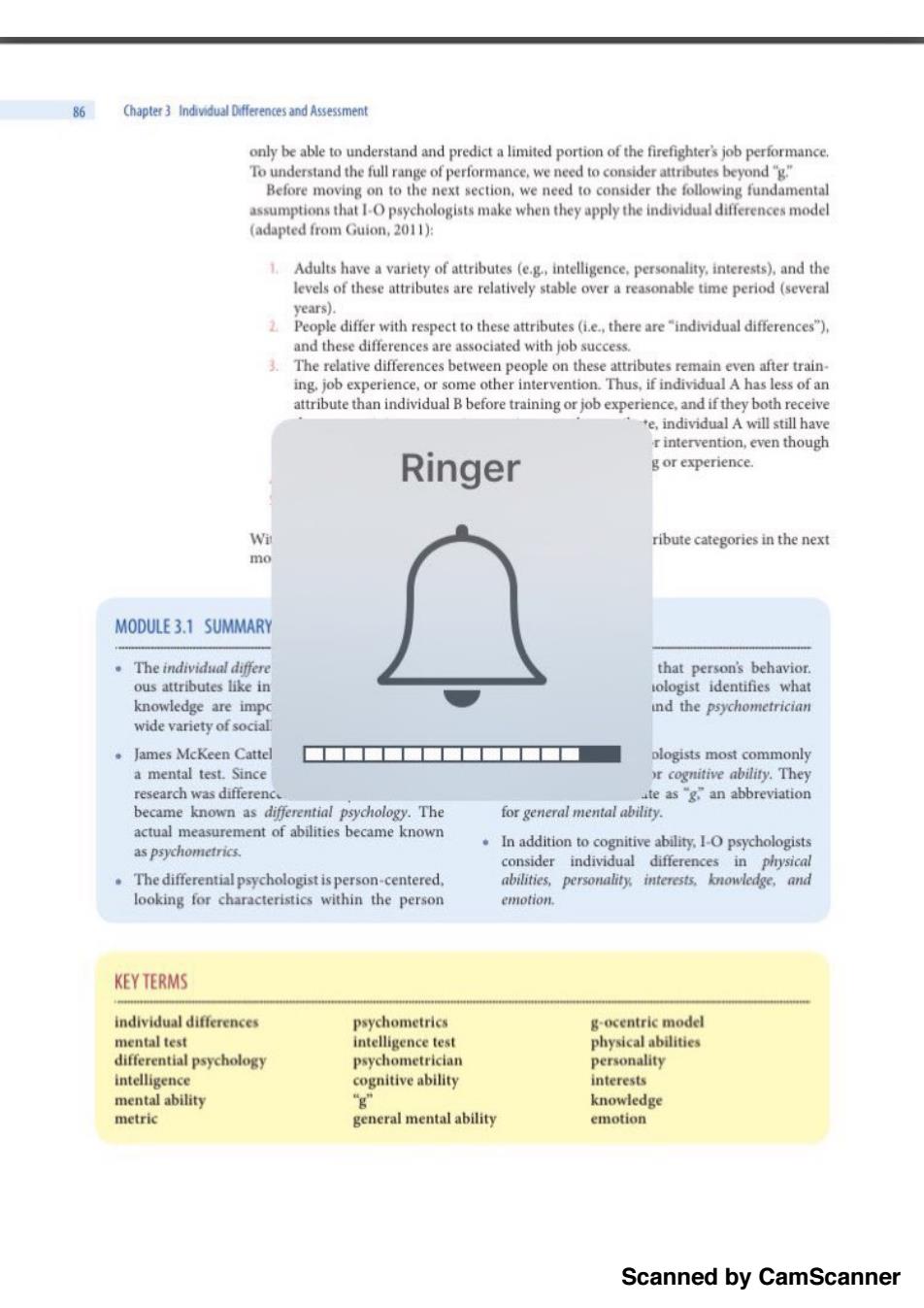
86 Chapter3 Individual Differencesand Assessment only be able to understand and predict a limited portion of the firefighter's job performance. To understand the full range of performance,we need to consider attributes beyond'g" Before moving on to the next section.we need to consider the following fundamental assumptions that I-O psychologists make when they apply the individual differences model (adapted from Guion,2011): 1 Adults have a variety of attributes (e.g.,intelligence,personality,interests).and the levels of these attributes are relatively stable over a reasonable time period (several years). 2 People differ with respect to these attributes(i.e.,there are"individual differences"). and these differences are associated with job success. 3. The relative differences between people on these attributes remain even after train- ing.job experience,or some other intervention.Thus,if individual A has less of an attribute than individual B before training or job experience,and if they both receive e,individual A will still have r intervention,even though Ringer g or experience. Wi ribute categories in the next mo MODULE 3.1 SUMMARY .The individual differe that person's behavior. ous attributes like in ologist identifies what knowledge are impc nd the psychometrician wide variety of social James McKeen Cattel plogists most commonly a mental test.Since orcognitive ability.They research was difference te as'g.an abbreviation became known as differential psychology.The for general mental ability. actual measurement of abilities became known as psychometrics. .In addition to cognitive ability,I-O psychologists consider individual differences in physical The differential psychologist is person-centered. abilities,personality. interests,knowledge,and looking for characteristics within the person emotion. KEY TERMS individual differences psychometrics g-ocentric model mental test intelligence test physical abilities differential psychology psychometrician personality intelligence cognitive ability interests mental ability g” knowledge metric general mental ability emotion Scanned by CamScanner
Scanned by CamScanner
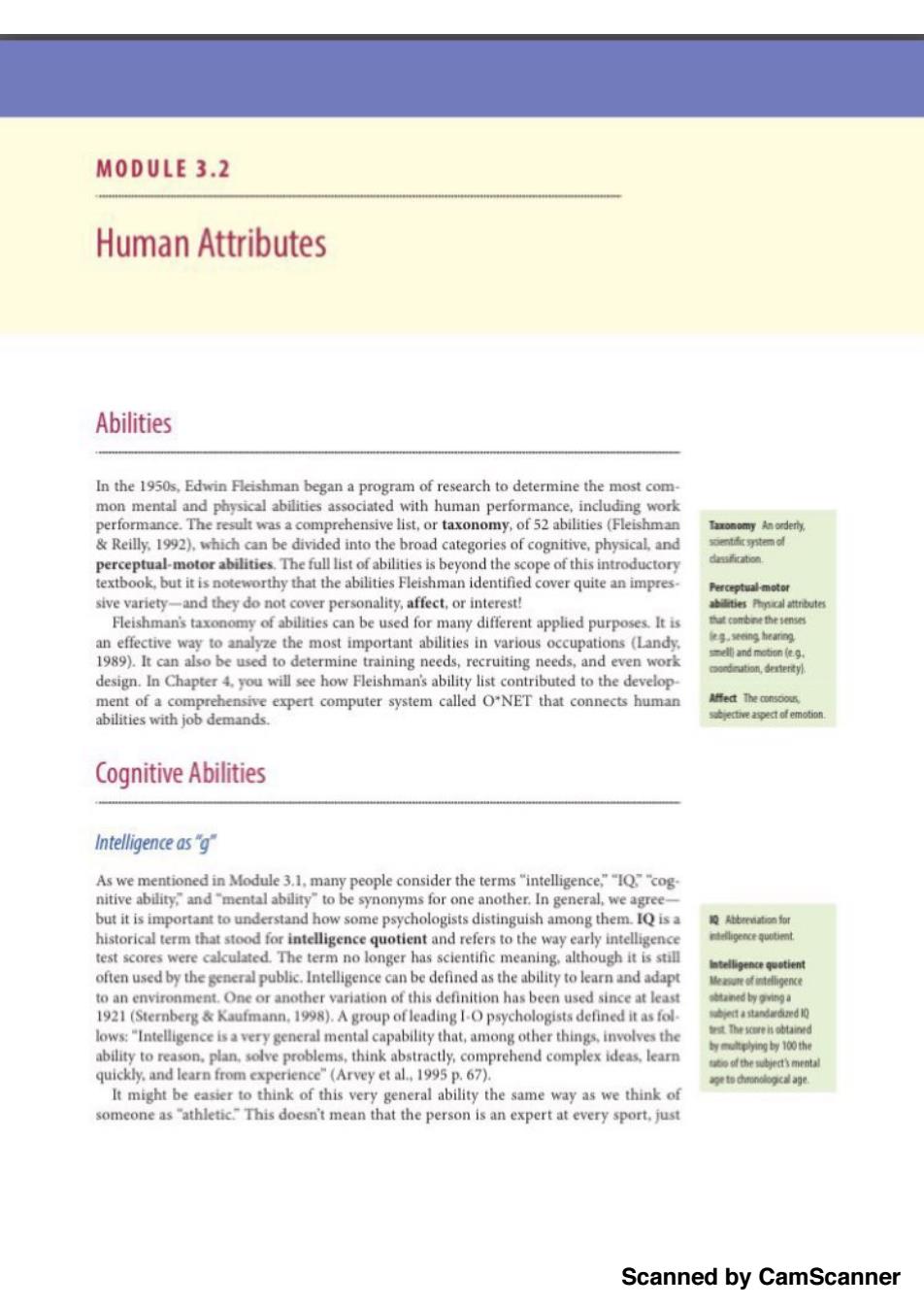
MODULE 3.2 Human Attributes Abilities In the 1950s,Edwin Fleishman began a program of research to determine the most com- mon mental and physical abilities associated with human performance,including work performance.The result was a comprehensive list,or taxonomy,of 52 abilities(Fleishman owo可norderty Reilly.1992),which can be divided into the broad categories of cognitive,physical,and t血td perceptual-motor abilities.The full list of abilities is beyond the scope of this introductory textbook,but it is noteworthy that the abilities Fleishman identified cover quite an impres- Perceptual-motor sive variety-and they do not cover personality,affect,or interest! abties Pical attrbutes Fleishman's taxonomy of abilities can be used for many different applied purposes It is that combne the senses an effective way to analyze the most important abilities in various occupations (Landy. legseeing hearing 1989).It can also be used to determine training needs,recruiting needs,and even work -and motion使g. design.In Chapter 4.you will see how Fleishman's ability list contributed to the develop- ment of a comprehensive expert computer system called O'NET that connects human Affect The consoous abilities with job demands. sjective aspect of emotinn Cognitive Abilities Intelligenceas As we mentioned in Module 3.1.many people consider the terms"intelligence,""IQ."cog- nitive ability,and "mental ability"to be synonyms for one another.In general,we agree- but it is important to understand how some psychologists distinguish among them.IQ is a 段比o historical term that stood for intelligence quotient and refers to the way early intelligence elligencequutimnt test scores were calculated.The term no longer has scientific meaning,although it is still telligence qutient often used by the general public.Intelligence can be defined as the ability to learn and adapt n威时ligence to an environment.One or another variation of this definition has been used since at least ady9的t 1921 (Sternberg Kaufmann.1998).A group of leading I-O psychologists defined it as fol. bject a standardized 1 lows:"Intelligence is a very general mental capability that,among other things,involves the 量The scure isobta的ed 与n的ng与60the ability to reason.plan.solve problems,think abstractly,comprehend complex ideas,learn of the sbiects mental quickly,and learn from experience"(Arvey et al.,1995 p.67). tedhnoogcala明 It might be easier to think of this very general ability the same way as we think of someone as "athletic."This doesn't mean that the person is an expert at every sport,just Scanned by CamScanner
Scanned by CamScanner
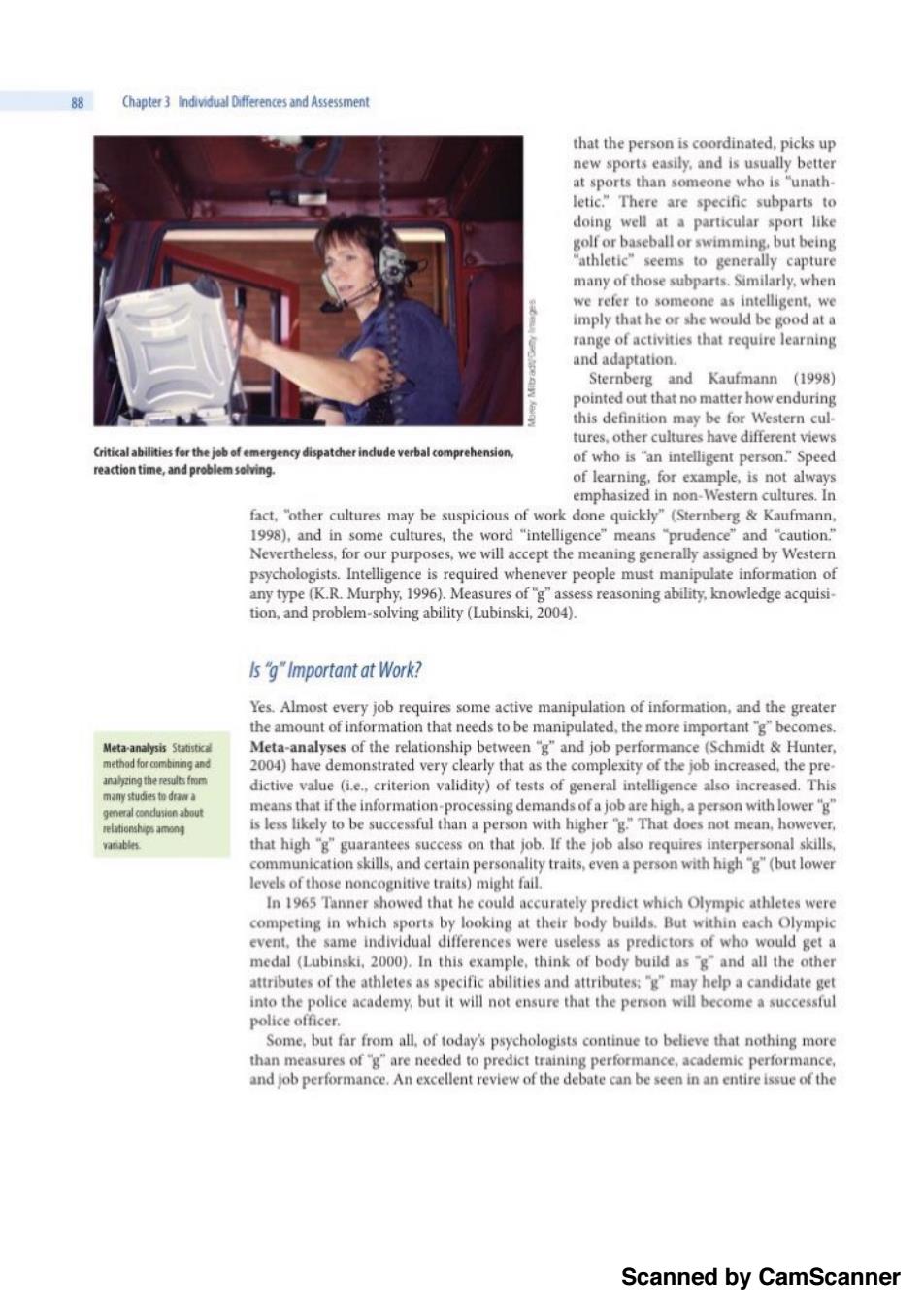
88 Chapter3 Individual Differencesand Assessment that the person is coordinated,picks up new sports easily.and is usually better at sports than someone who is "unath- letic."There are specific subparts to doing well at a particular sport like golf or baseball or swimming.but being "athletic"seems to generally capture many of those subparts.Similarly,when we refer to someone as intelligent,we imply that he or she would be good at a range of activities that require learning and adaptation. Sternberg and Kaufmann (1998) pointed out that no matter how enduring this definition may be for Western cul. tures,other cultures have different views Critical abilities for the job of emergency dispatcher indude verbal comprehension. of who is "an intelligent person."Speed reaction time,and problem solving. of learning,for example,is not always emphasized in non-Western cultures.In fact,"other cultures may be suspicious of work done quickly"(Sternberg Kaufmann, 1998),and in some cultures,the word "intelligence"means "prudence"and "caution." Nevertheless,for our purposes,we will accept the meaning generally assigned by Western psychologists.Intelligence is required whenever people must manipulate information of any type (K.R.Murphy,1996).Measures of"g"assess reasoning ability,knowledge acquisi- tion,and problem-solving ability (Lubinski,2004) Is g"Important at Work? Yes.Almost every job requires some active manipulation of information,and the greater the amount of information that needs to be manipulated,the more important'g"becomes. Meta-analysis Statistica Meta-analyses of the relationship between "g"and job performance (Schmidt Hunter, method for combining and 2004)have demonstrated very clearly that as the complexity of the job increased,the pre- analzing the resul色fom dictive value (i.e.,criterion validity)of tests of general intelligence also increased.This ma呼uds自dawa general condusion about means that if the information-processing demands of a job are high,a person with lower'"g" relationshpamng is less likely to be successful than a person with higher'g."That does not mean,however. variables that high "g"guarantees success on that job.If the job also requires interpersonal skills, communication skills,and certain personality traits,even a person with high"g"(but lower levels of those noncognitive traits)might fail. In 1965 Tanner showed that he could accurately predict which Olympic athletes were competing in which sports by looking at their body builds.But within each Olympic event,the same individual differences were useless as predictors of who would get a medal (Lubinski,2000).In this example,think of body build as'g"and all the other attributes of the athletes as specific abilities and attributes:'g"may help a candidate get into the police academy,but it will not ensure that the person will become a successful police officer. Some,but far from all,of today's psychologists continue to believe that nothing more than measures ofg"are needed to predict training performance,academic performance, and job performance.An excellent review of the debate can be seen in an entire issue of the Scanned by CamScanner
Scanned by CamScanner
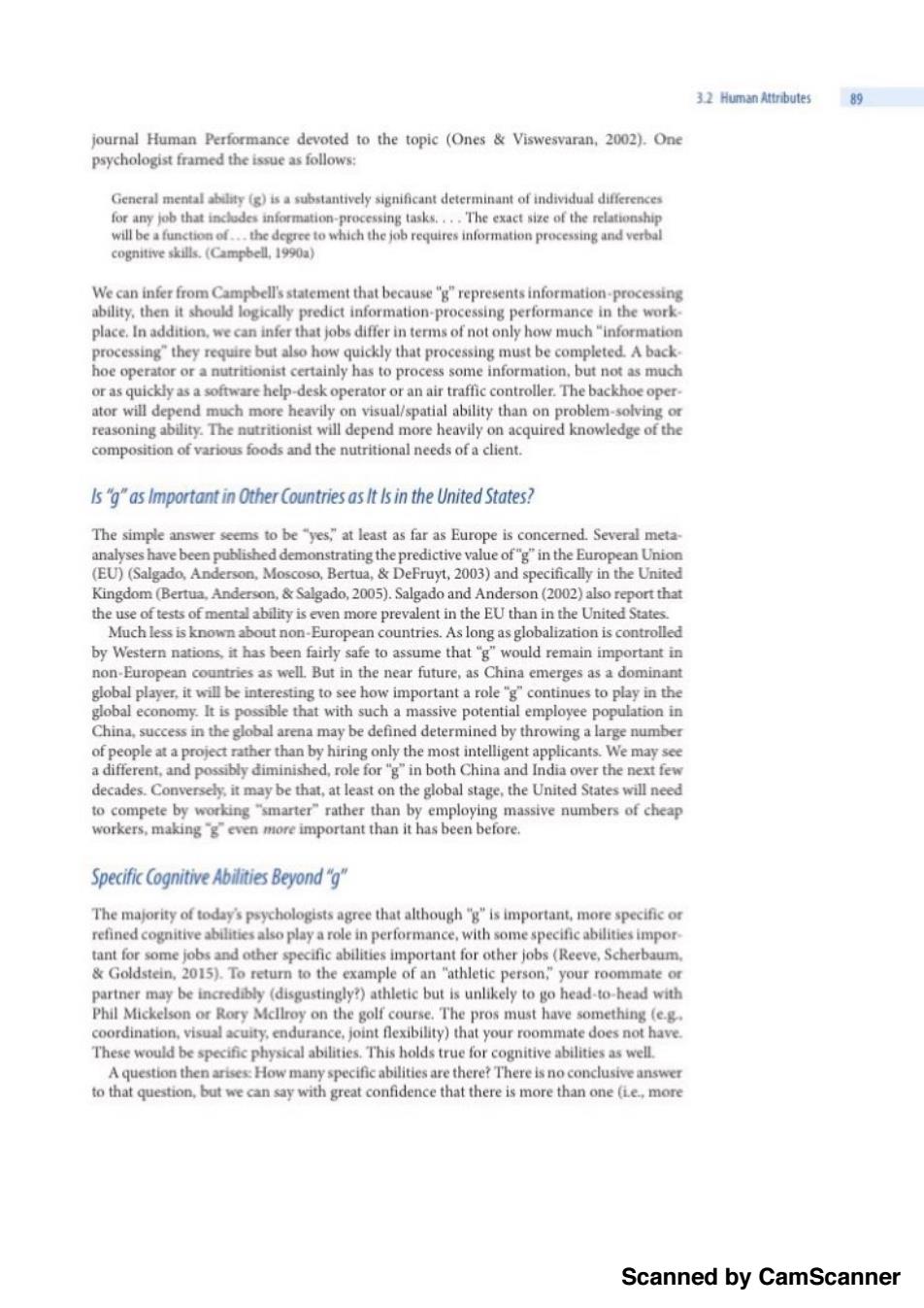
3.2 Human Attributes 9 journal Human Performance devoted to the topic (Ones Viswesvaran,2002).One psychologist framed the issue as follows: General mental ability (g)is a substantively significant determinant of individual differences for any job that incldes information-processing tasks....The exact size of the relationship will be a function of...the degree to which the job requires information processing and verbal cognitive skills.(Campbell,1990a) We can infer from Campbell's statement that because "g"represents information-processing ability.then it should logically predict information-processing performance in the work- place.In addition.we can infer that jobs differ in terms of not only how much"information processing"they require but also how quickly that processing must be completed.A back. hoe operator or a nutritionist certainly has to process some information.but not as much or as quickly as a software help-desk operator or an air traffic controller.The backhoe oper. ator will depend much more heavily on visual/spatial ability than on problem-solving or reasoning ability.The nutritionist will depend more heavily on acquired knowledge of the composition of various foods and the nutritional needs of a client. Is g"as Important in Other Countries as It Is in the United States? The simple answer seems to be "yes,"at least as far as Europe is concerned.Several meta- analyses have been published demonstrating the predictive value of "g"in the European Union (EU)(Salgado,Anderson,Moscoso,Bertua,&DeFruyt,2003)and specifically in the United Kingdom(Bertua.Anderson,Salgado,2005).Salgado and Anderson(2002)also report that the use of tests of mental ability is even more prevalent in the EU than in the United States. Much less is known about non-European countries.As long as globalization is controlled by Western nations,it has been fairly safe to assume that'g"would remain important in non-European countries as well.But in the near future,as China emerges as a dominant global player,it will be interesting to see how important a role'g"continues to play in the global economy.It is possible that with such a massive potential employee population in China,success in the global arena may be defined determined by throwing a large number of people at a project rather than by hiring only the most intelligent applicants.We may see a different,and possibly diminished,role for'g"in both China and India over the next few decades.Conversely,it may be that,at least on the global stage,the United States will need to compete by working "smarter"rather than by employing massive numbers of cheap workers,making 'g"even more important than it has been before. Specific Cognitive Abilities Beyond "g" The majority of today's psychologists agree that although 'g"is important,more specific or refined cognitive abilities also play a role in performance,with some specific abilities impor- tant for some jobs and other specific abilities important for other jobs(Reeve,Scherbaum. Goldstein,2015).To return to the example of an "athletic person,"your roommate or partner may be incredibly (disgustingly?)athletic but is unlikely to go head-to-head with Phil Mickelson or Rory Mcllroy on the golf course.The pros must have something (e-g. coordination,visual acuity,endurance,joint flexibility)that your roommate does not have. These would be specific physical abilities.This holds true for cognitive abilities as well. A question then arises:How many specific abilities are there?There is no conclusive answer to that question,but we can say with great confidence that there is more than one (ie,more Scanned by CamScanner
Scanned by CamScanner
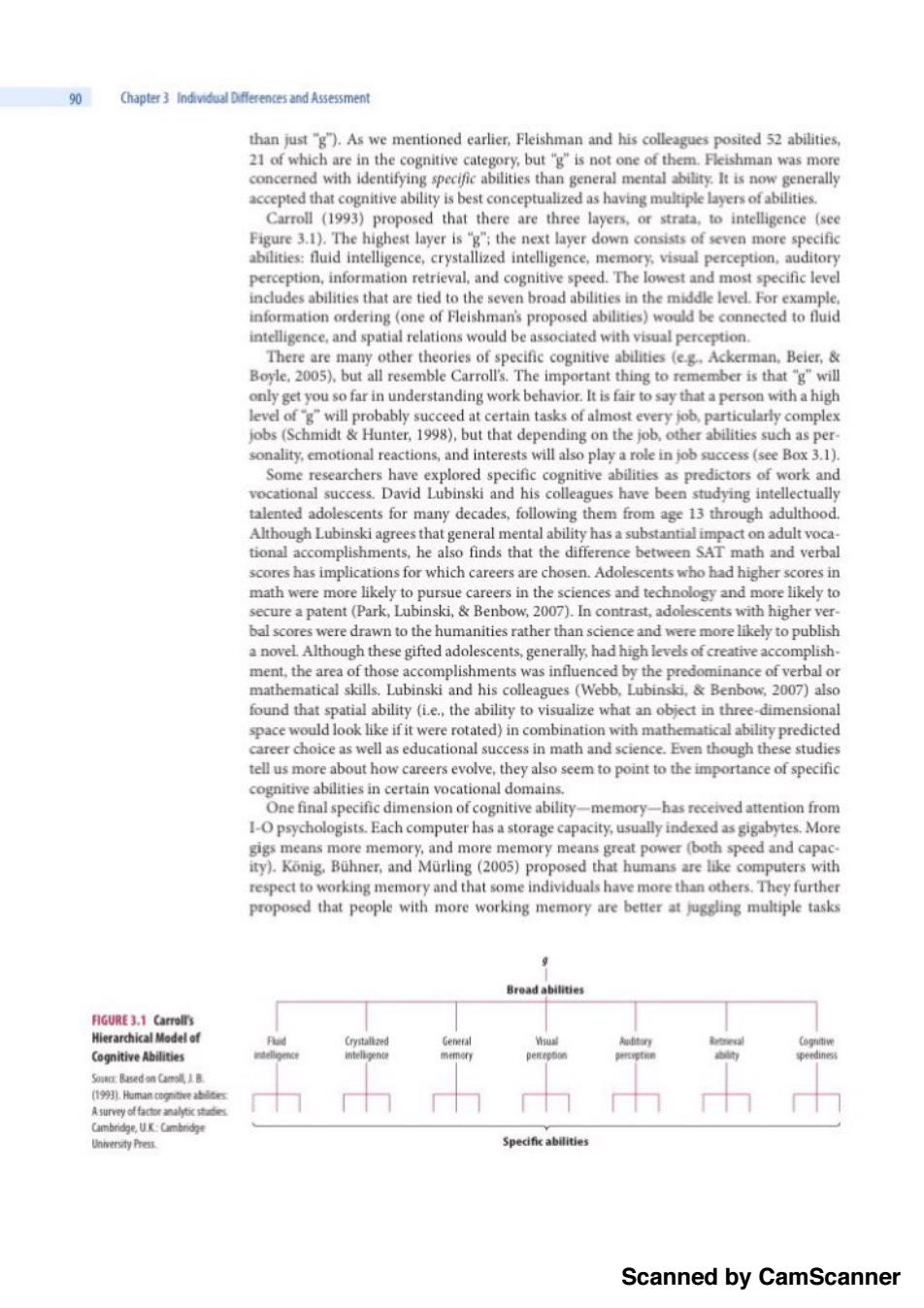
Chapter3 Individual Dfferences and Assessment than just "g").As we mentioned earlier,Fleishman and his colleagues posited 52 abilities, 21 of which are in the cognitive category,but "g"is not one of them.Fleishman was more concerned with identifying specific abilities than general mental ability.It is now generally accepted that cognitive ability is best conceptualized as having multiple layers of abilities. Carroll (1993)proposed that there are three layers,or strata.to intelligence (see Figure 3.1).The highest layer is 'g";the next layer down consists of seven more specific abilities:fluid intelligence,crystallized intelligence,memory,visual perception,auditory perception,information retrieval,and cognitive speed.The lowest and most specific level includes abilities that are tied to the seven broad abilities in the middle level.For example, information ordering (one of Fleishman's proposed abilities)would be connected to fluid intelligence,and spatial relations would be associated with visual perception. There are many other theories of specific cognitive abilities (eg.Ackerman.Beier, Boyle,2005),but all resemble Carroll's.The important thing to remember is that 'g"will only get you so far in understanding work behavior.It is fair to say that a person with a high level of'g"will probably succeed at certain tasks of almost every job,particularly complex jobs(Schmidt Hunter,1998),but that depending on the job,other abilities such as per- sonality,emotional reactions,and interests will also play a role in job success(see Box 3.1). Some researchers have explored specific cognitive abilities as predictors of work and vocational success.David Lubinski and his colleagues have been studying intellectually talented adolescents for many decades,following them from age 13 through adulthood Although Lubinski agrees that general mental ability has a substantial impact on adult voca. tional accomplishments,he also finds that the difference between SAT math and verbal scores has implications for which careers are chosen.Adolescents who had higher scores in math were more likely to pursue careers in the sciences and technology and more likely to secure a patent(Park,Lubinski,Benbow,2007).In contrast,adolescents with higher ver bal scores were drawn to the humanities rather than science and were more likely to publish a novel Although these gifted adolescents,generally,had high levels of creative accomplish- ment,the area of those accomplishments was influenced by the predominance of verbal or mathematical skills.Lubinski and his colleagues (Webb.Lubinski,Benbow.2007)also found that spatial ability (i.e.,the ability to visualize what an object in three-dimensional space would look like if it were rotated)in combination with mathematical ability predicted career choice as well as educational success in math and science.Even though these studies tell us more about how careers evolve,they also seem to point to the importance of specific cognitive abilities in certain vocational domains. One final specific dimension of cognitive ability-memory-has received attention from 1-0 psychologists.Each computer has a storage capacity,usually indexed as gigabytes.More gigs means more memory,and more memory means great power (both speed and capac. ity).Konig.Buhner,and Murling(2005)proposed that humans are like computers with respect to working memory and that some individuals have more than others.They further proposed that people with more working memory are better at juggling multiple tasks Bread abilities 月GURE3.1 Carroll Hierarchical Model of Crystallized General Cognitive Abilities Souner:Based on Caroll 1B l月.Human citive abtes A survey of factor analytic中s Cambridge,UK:Cambridge Uniersty Press. Specific abilities Scanned by CamScanner
Scanned by CamScanner